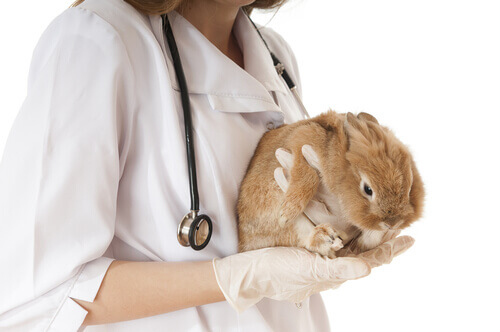How To Get Rid of Parasites in Rabbits

Both wild and domesticated rabbits are prone to parasite infections. The types of parasites that affect rabbits might not be as well known as those that are common in dogs and cats. As a result, it’s important you know about parasites in rabbits and how to get rid of them.
Internal or intestinal parasites in rabbits
Parasites can affect animals internally. For example, they can affect organs such as the intestine or spleen. Parasites can also affect animals externally, by nesting under the skin or in animals’ ears. Both the symptoms and severity of the infection vary depending on where the parasites are.
The most common internal parasites affect the intestine. Among these parasites are some that cause the disease coccidiosis. This disease affects both animals and humans, especially immunosuppressed individuals.
Among the most common symptoms of coccidiosis are diarrhea, weight loss, and reduced appetite. In fact, if not treated in time, this disease can dehydrate your rabbit. As a result, this makes them more prone to bacterial infections, which can have deadly consequences.

Another known intestinal parasite is the nematode or roundworm. Initially, this doesn’t cause symptoms. However, they can affect the stomach or other parts of the digestive system since these parasites enter the host orally. In fact, if your rabbit begins to lose weight or suddenly stops gaining weight, they could have worms.
External parasites
You likely already know how to identify this type of parasite. In fact, you might even know how to get rid of these parasites in rabbits.
For example, fleas are a common external parasite in virtually all mammals. These animals cause itching, stinging, and skin irritation. You can tell if your rabbit has fleas by checking how often they scratch themselves.
However, ticks are less common in rabbits. Usually, they are only exposed to ticks if they live in a rural environment. The main problem with this type of parasite is that they carry various diseases. As a result, it’s important to check their fur regularly and learn how to remove them safely.
The Cuterebra fly is more common in dogs. However, if these affect your rabbit, it can lead to serious health consequences. These flies usually live in the wild. For example, your rabbit can end up with an infection if they rub against the stem of a plant that has this larva. Then, these parasites burrow under the animal’s skin and form a circular lump. In fact, this lump is usually visible through the skin.

If your rabbit is infected with this larva, it’s very important that you don’t try to remove it yourself. For example, if you try to squeeze the lump to get the parasite out, your rabbit may go into shock. You need to see your vet as soon as possible if you think your rabbit might have this parasite, but don’t try anything at home.
Effective methods to treat parasites in rabbits
Treatments for parasites vary according to the type of parasite that’s affecting your pet.
- In the case of intestinal parasites or those that affect the digestive system, these usually infect your rabbit orally. As a result, it’s important to check for larvae in your rabbit’s feces. This can help you obtain a definitive diagnosis from your veterinarian. To get rid of these parasites in rabbits, there are various medications. For example, your vet may prescribe Fenbendazole, which you can give to your rabbit in the form of a syrup.
- In the case of fleas, you can use a special cone to remove fleas. There are also lots of insecticidal powders and sprays. However, to remove ticks, we recommend applying oil to make removing the ticks’ heads easier. If you don’t remove the heads, they can stay under the rabbit’s skin, which can lead to infection.
Both wild and domesticated rabbits are prone to parasite infections. The types of parasites that affect rabbits might not be as well known as those that are common in dogs and cats. As a result, it’s important you know about parasites in rabbits and how to get rid of them.
Internal or intestinal parasites in rabbits
Parasites can affect animals internally. For example, they can affect organs such as the intestine or spleen. Parasites can also affect animals externally, by nesting under the skin or in animals’ ears. Both the symptoms and severity of the infection vary depending on where the parasites are.
The most common internal parasites affect the intestine. Among these parasites are some that cause the disease coccidiosis. This disease affects both animals and humans, especially immunosuppressed individuals.
Among the most common symptoms of coccidiosis are diarrhea, weight loss, and reduced appetite. In fact, if not treated in time, this disease can dehydrate your rabbit. As a result, this makes them more prone to bacterial infections, which can have deadly consequences.

Another known intestinal parasite is the nematode or roundworm. Initially, this doesn’t cause symptoms. However, they can affect the stomach or other parts of the digestive system since these parasites enter the host orally. In fact, if your rabbit begins to lose weight or suddenly stops gaining weight, they could have worms.
External parasites
You likely already know how to identify this type of parasite. In fact, you might even know how to get rid of these parasites in rabbits.
For example, fleas are a common external parasite in virtually all mammals. These animals cause itching, stinging, and skin irritation. You can tell if your rabbit has fleas by checking how often they scratch themselves.
However, ticks are less common in rabbits. Usually, they are only exposed to ticks if they live in a rural environment. The main problem with this type of parasite is that they carry various diseases. As a result, it’s important to check their fur regularly and learn how to remove them safely.
The Cuterebra fly is more common in dogs. However, if these affect your rabbit, it can lead to serious health consequences. These flies usually live in the wild. For example, your rabbit can end up with an infection if they rub against the stem of a plant that has this larva. Then, these parasites burrow under the animal’s skin and form a circular lump. In fact, this lump is usually visible through the skin.

If your rabbit is infected with this larva, it’s very important that you don’t try to remove it yourself. For example, if you try to squeeze the lump to get the parasite out, your rabbit may go into shock. You need to see your vet as soon as possible if you think your rabbit might have this parasite, but don’t try anything at home.
Effective methods to treat parasites in rabbits
Treatments for parasites vary according to the type of parasite that’s affecting your pet.
- In the case of intestinal parasites or those that affect the digestive system, these usually infect your rabbit orally. As a result, it’s important to check for larvae in your rabbit’s feces. This can help you obtain a definitive diagnosis from your veterinarian. To get rid of these parasites in rabbits, there are various medications. For example, your vet may prescribe Fenbendazole, which you can give to your rabbit in the form of a syrup.
- In the case of fleas, you can use a special cone to remove fleas. There are also lots of insecticidal powders and sprays. However, to remove ticks, we recommend applying oil to make removing the ticks’ heads easier. If you don’t remove the heads, they can stay under the rabbit’s skin, which can lead to infection.
This text is provided for informational purposes only and does not replace consultation with a professional. If in doubt, consult your specialist.








